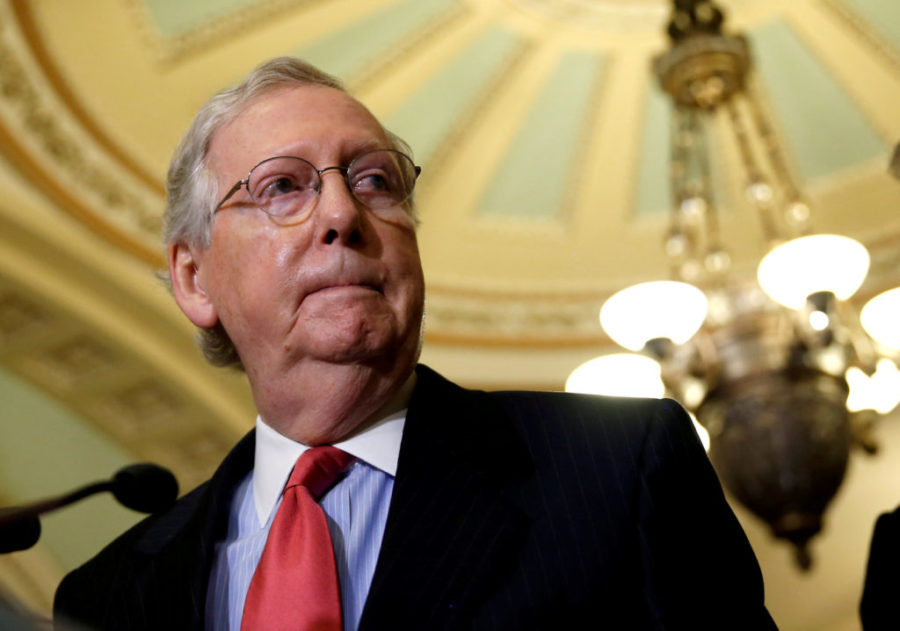Republican Tax Plan Attempts to Make the Rich Richer
FILE PHOTO: Líder mayoritario del Senado Mitch McConnel (R-KY) habla con periodistas después del almuerzo de política republicano en el Capitol Hill en Washington, DC, U.S. 24 de octubre, 2017. REUTERS/Joshua Roberts/File Photo – RC1CE1593BA0
December 15, 2017
The Republican party has, in recent months, been attempting to pass tax legislation.
The House of Representatives’ bill passed on Nov. 16, while the Senate passed the bill early in the morning of Dec. 1. Now that both the House and Senate have passed their separate bills, they will have to come together and reconcile the differences in both bills before passing the final bill onto the President’s desk. They voted on the separate bills instead of one finalized bill in order to pass with a simple majority in the Senate, rather than pull 60 votes together in a chamber where they hold only 52 seats.
The structure of the House tax plan involves reducing the number of income brackets currently taxed from seven to four. Both the Senate and the House bills reduce the corporate income rate from 35% to 20%. The plans also remove some tax credit deductions, like those for state and local taxes while increasing others, like those for the child tax deduction.
Proponents of the bill argue that these reductions will put more money in the hands of middle class Americans, which is true. Due to the changes in brackets and increases in the standard deduction, individuals could save thousands of dollars. However, these deductions do come with a cost, especially the cut to the corporate tax rate. The Congressional Budgeting Office (CBO) estimates that the deficit would increase by as much as $1.7 trillion under the house bill.
This increase in the national deficit is exactly what Republicans have criticized about government expenditures such as Obamacare, yet they are promoting a bill that would further balloon the nation’s debt. This ballooning will not be the result of any tangible societal benefit such as healthcare, but rather as a slight increase in the money in Americans’ pockets. Most of that money would be going to the wealthy rather than to the middle class.
In addition, deductions for graduate students’ expenses will be cut under the plan. These students who earn a very small income may be forced to end their studies, reducing the amount of highly educated Americans. Tax credits for “orphan” drugs, or drugs for rare conditions which are often expensive, would also be heavily reduced. This reduction would make it more difficult for patients with rare conditions to pay for medicine.
The supporters of the bill believe that the economic growth generated by tax cuts will cover the deficit within ten years. This is a possibility. However, it is not definite whether tax cuts are responsible for economic growth. According to a University of Chicago’s Booth School of Business 2012 survey of top economists, 35% believed that tax cuts would result in a higher GDP., 35% were not sure, and 8% disagree. It is nearly impossible to determine in a country on the scale of the United States what measures will encourage growth or which will cause no change or a decrease in growth. Tax cuts need to be accompanied by large spending cuts in order to counteract the deficit created by tax cuts.
Under Trump’s proposed budget, these tax cuts could be made up for, but it comes down to what we value as a country. Taxes are unpopular, and probably always will be. However, the nation often benefits from the programs that will be cut down in order to pay for this tax plan. Education spending is essential into raising the intelligence, ingenuity and creativity in the next generation. Investments into the EPA are necessary as global warming continues to worsen environmental problems faced by the nation and world. The EPA also needs to tend to its growing list of cleanup sites, including the Animas River Gold King Mine spill. As a nation, if we don’t value progress in our environment and education and would instead put a small sum in most Americans’ pockets (disproportionally the wealthy) that could or could not actually grow the economy, then we can do that. However, if we are interested in true, positive change, this tax plan must be learned from and not repeated.

